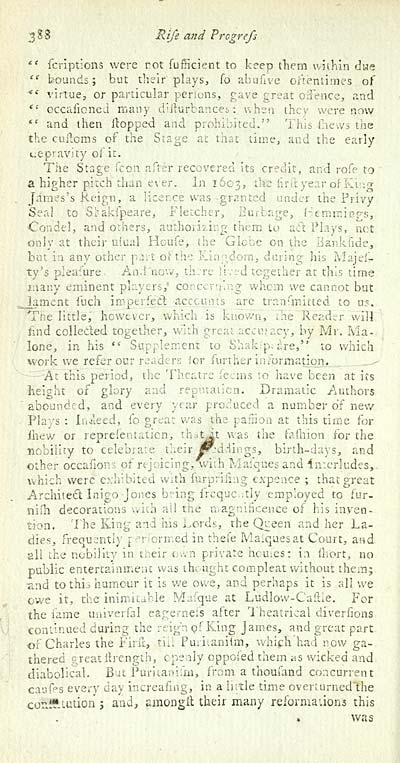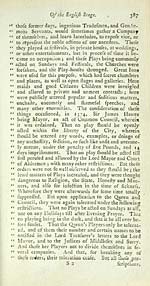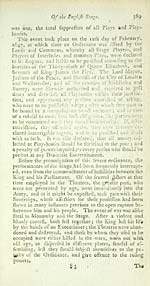Glen Collection of printed music > Printed text > New theatrical dictionary
(402) Page 388
Download files
Complete book:
Individual page:
Thumbnail gallery: Grid view | List view

3 §8 Rife and Prcgrefs
iC (captions were not fufficient to keep them within dt4e
" bounds; but their plays, fo abufive oftentimes of
*< virtue, or particular peribns, gave great offence, and
" occaiioned many disturbances: when they were now
iC and then flopped and prohibited," This fliews the
the cufloms of the Stage at that time, and the early
cepravity of it.
The Stage fcon after recovered its credit, and rofe to
& higher pitch than ever. In. 1603, the finl year of King
James's Reign, a licence was ^granted under the Privy
Seal to Sbakfpea.re, Fletcher, Barb-age, Bemrcicgs,
Condel, and others, authorizing them to act Plays, not
only at their uiuai Hcufe, the Glebe on the Rankude,
but in any other part of the Kingdom, during Iris Majes-
ty's pleafure, And now, there lived together at this time
many eminent players, concerning whom we cannot but
lament fuch imperfect account s are tranfmitted to us.
The little, however, which is known, tKe Reader will
find collected together, with great accuracy, by Mr. Ma-
lone, in his fi Supplement to Sha'kipt are," to which
work we refer our reader,'; lor further informa tion.
At this period, the Theatre feems to have been at its
Height of glory and reputation. Dramatic Authors
abounded, and every year produced a number of new
Plays : Indeed, fo great was the painon at this time for
ihew or reprefentation, thr.t^t was the fafhion for the
-nobility to celebrate their jRddings, birth-clays, and
other occasions of rejoicing, with Ma:cues and interludes,
which were exhibited with furprifmg expence ; that great
Architect Inigo Jones being frequently employed to fur-
nifh decorations with all the magnificence of his inven-
tion. 'The King and ins Lords, the Queen and her La-
dies, frequent!}' performed in thefe Maiquesat Court, and
all the nobility in their ovV.n private homes: in fliort, no
public entertainment was thought compleat without them;
and to this humour it is we owe, and perhaps it is all we
owe it, the inimitable Mafque at Ludlow-Caflie. For
the lame univerfal eagernefs after Theatrical diver/ions
continued during the reign of King James, and great part
of Charles the Pint, till PuritaniTm, whipn'had now ga-
thered great itrengtb, openly opposed them as wicked and
diabolical. But Puritanifm, from a thoufand concurrent
caufes every day increafing, in a little time overturned the
coS&tution ; and, amongil their many reformations this
was
iC (captions were not fufficient to keep them within dt4e
" bounds; but their plays, fo abufive oftentimes of
*< virtue, or particular peribns, gave great offence, and
" occaiioned many disturbances: when they were now
iC and then flopped and prohibited," This fliews the
the cufloms of the Stage at that time, and the early
cepravity of it.
The Stage fcon after recovered its credit, and rofe to
& higher pitch than ever. In. 1603, the finl year of King
James's Reign, a licence was ^granted under the Privy
Seal to Sbakfpea.re, Fletcher, Barb-age, Bemrcicgs,
Condel, and others, authorizing them to act Plays, not
only at their uiuai Hcufe, the Glebe on the Rankude,
but in any other part of the Kingdom, during Iris Majes-
ty's pleafure, And now, there lived together at this time
many eminent players, concerning whom we cannot but
lament fuch imperfect account s are tranfmitted to us.
The little, however, which is known, tKe Reader will
find collected together, with great accuracy, by Mr. Ma-
lone, in his fi Supplement to Sha'kipt are," to which
work we refer our reader,'; lor further informa tion.
At this period, the Theatre feems to have been at its
Height of glory and reputation. Dramatic Authors
abounded, and every year produced a number of new
Plays : Indeed, fo great was the painon at this time for
ihew or reprefentation, thr.t^t was the fafhion for the
-nobility to celebrate their jRddings, birth-clays, and
other occasions of rejoicing, with Ma:cues and interludes,
which were exhibited with furprifmg expence ; that great
Architect Inigo Jones being frequently employed to fur-
nifh decorations with all the magnificence of his inven-
tion. 'The King and ins Lords, the Queen and her La-
dies, frequent!}' performed in thefe Maiquesat Court, and
all the nobility in their ovV.n private homes: in fliort, no
public entertainment was thought compleat without them;
and to this humour it is we owe, and perhaps it is all we
owe it, the inimitable Mafque at Ludlow-Caflie. For
the lame univerfal eagernefs after Theatrical diver/ions
continued during the reign of King James, and great part
of Charles the Pint, till PuritaniTm, whipn'had now ga-
thered great itrengtb, openly opposed them as wicked and
diabolical. But Puritanifm, from a thoufand concurrent
caufes every day increafing, in a little time overturned the
coS&tution ; and, amongil their many reformations this
was
Set display mode to: Large image | Transcription
Images and transcriptions on this page, including medium image downloads, may be used under the Creative Commons Attribution 4.0 International Licence unless otherwise stated. ![]()
| Special collections of printed music > Glen Collection of printed music > Printed text > New theatrical dictionary > (402) Page 388 |
|---|
| Permanent URL | https://digital.nls.uk/90320189 |
|---|
| Description | Scottish songs and music of the 18th and early 19th centuries, including music for the Highland bagpipe. These are selected items from the collection of John Glen (1833 to 1904). Also includes a few manuscripts, some treatises, and other books on the subject. |
|---|
| Description | The Glen Collection and the Inglis Collection represent mainly 18th and 19th century Scottish music, including Scottish songs. The collections of Berlioz and Verdi collected by bibliographer Cecil Hopkinson contain contemporary and later editions of the works of the two composers Berlioz and Verdi. |
|---|

